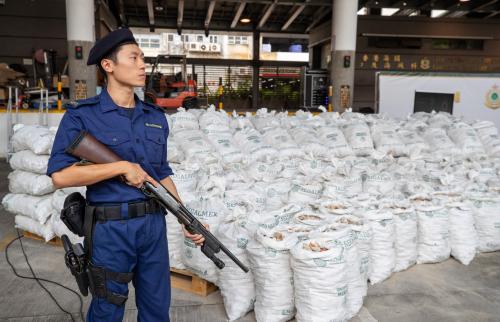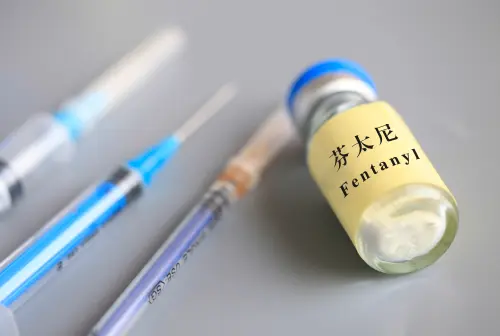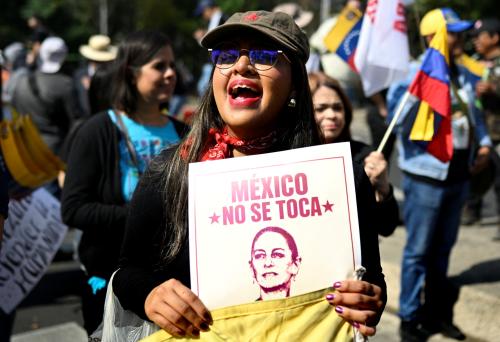This piece is part of a series titled “Nonstate armed actors and illicit economies in 2024” from Brookings’s Initiative on Nonstate Armed Actors.
In November 2023, China agreed to restart cooperation with U.S. authorities to counter the flow of fentanyl and other synthetic opioids and their precursors into the United States. This refound willingness comes after more than two years of China purposefully denying cooperation and failing to mount adequate internal enforcement. China’s strategic goal to stabilize the U.S.-China relationship was a crucial motivation, but U.S. diplomacy and actions also played an important role in bringing China back to cooperation. What remains to be seen in 2024 is how robust that anti-drug cooperation will be.
A diplomatic breakthrough
The diplomatic breakthrough relaunching cooperation was announced at the November 2023 meeting between President Joe Biden and President Xi Jinping. As part of the renewed cooperation, a joint U.S.-China counternarcotics working group was recreated.
Even before the summit, China’s National Narcotics Control Commission notified Chinese pharmaceutical companies across the country’s provinces that it was now monitoring and enforcing precursor export controls. Like in 2019 and 2020, China also took down some Chinese websites selling precursor chemicals to international criminal groups.
In return, China received one long-desired, visible concession from Washington: the removal of sanctions from the Institute of Forensic Science in China, which had been designated for its complicity in human rights abuses in Xinjiang.
China’s commitments
In January 2024, the resurrected U.S.-China counternarcotics commission held its first meeting. High-level Chinese officials promised ambitious outcomes, even as non-action hedging did not completely disappear.
China also agreed to enforcement cooperation on pill press exports, a vital element of the illegal drug trade enabling the production of lethal, fake OxyContin pills. China had long resisted putting any regulatory controls on pill presses to maximize its economic interests.
China also committed itself to anti-money laundering (AML) cooperation with the United States, something China had long denied to the United States and other countries even though Chinese money launderers have been working for Mexican cartels, displacing the Black Peso Market, and facilitating organized crime in Europe. This time, representatives from Chinese banks attended some of the U.S.-China counternarcotics side meetings.
China also agreed to expand its multilateral engagement on synthetic drug control: In March, it will host a session on nonscheduled precursors at the annual meetings of the Commission on Narcotics Drugs in Vienna.
And finally, U.S. officials have told me that China has started acting on U.S.-provided intelligence about Chinese drug networks. Compared to the many years when the commission’s previous iterations essentially amounted to platforms for mutual recrimination, at least some temporary progress has been made.
Why China resumed cooperation
Two factors brought about China’s turnaround: 1) its geostrategic calculations and 2) adroit and appropriately tough U.S. diplomacy.
In the last several years, U.S.-China relations deteriorated to a level of tensions unseen in decades across a wide range of issues—including military alliances and power projection in the Asia-Pacific, China’s facilitation of Russia’s egregious war against Ukraine, Chinese spying of sensitive technologies, and Taiwan. With China’s economic growth slowed since COVID-19, the intensified competition has put further strains on China. Both countries came to desire a more stable rivalry and looked for a way to put a floor underneath their relationship’s freefall. Resurrecting bilateral counternarcotics enforcement and military-to-military exchanges and increasing cooperation on climate change mitigation and artificial intelligence were all opportunities to do so.
Moreover, U.S. diplomacy effectively raised the reputational and other costs for China and Chinese actors. In July 2023, the United States organized and launched a new Global Coalition to Address Synthetic Drug Threats. Although China prides itself on being a tough drug cop and tends to be very active in global counternarcotics diplomacy, it abstained from joining while nearly 100 countries signed up.
China’s counternarcotics reputation took another hit in September 2023 when the United States placed it on its annual list of major drug-producing or transit countries (aka the Majors List). While some countries have become indifferent to the listing, calculating they can escape sanctions through U.S. national security interest exceptions, these reputational costs do matter to China.
Crucially, in 2023, the U.S. Department of Justice issued a set of innovative and powerful indictments against Chinese networks selling nonscheduled precursors to Mexican cartels and the Department of Treasury sanctioned various Chinese firms. China has long excused its inaction against these flows by insisting it cannot act against nonscheduled chemicals, such as the dual-use precursors from which much of fentanyl is produced today. Centered on prohibitions of material support to organized crime groups, the indictments revealed Chinese suppliers knowingly selling to Mexican cartels and providing them with formulas and kits on how best to process the nonscheduled chemicals into fentanyl.
As an important pressure tool, the United States denied visas to various Chinese officials and business executives, while the U.S. Congress held multiple hearings on China’s role in the U.S. drug epidemic and a U.S. Senate delegation to China emphasized the issue.
What to expect in 2024
It is unlikely that China will end its approach of subordinating its anti-drug and anti-crime cooperation to its strategic calculus. The United States has long—and likely futilely—hoped to get China to delink anti-crime cooperation from the overall state of the bilateral relationship and establish strong law enforcement cooperation separate from geopolitics.
Thus, even while China’s current goal is to reduce tensions, China’s drug cooperation is vulnerable to new crises in the bilateral relationship. Moreover, even this possibly time-bound counternarcotics cooperation is unlikely to become extensive.
Key indicators of China’s seriousness will include China’s responsiveness to U.S. intelligence provision, arrests and prosecutions in China, and equivalent sharing of intelligence.
Already, China maintains that it is unlikely to deliver many arrests and prosecutions, U.S. officials tell me. China still insists that it cannot prosecute nonscheduled substances, claiming the lack of material support laws pertaining to organized crime. If these laws are genuinely lacking in China, the world’s most extensive police and surveillance state, China should either strengthen the laws or find other mechanisms in its draconian drug laws to prosecute Chinese violators.
China’s consistency and robustness in monitoring and regulating Chinese pharmaceutical and chemical industries are other useful measures of the seriousness of China’s cooperation. Specifically, beyond regular messaging that China is now serious about controlling drug exports and the above prosecution, China’s willingness to promote the adoption of Know Your Customer (KYC) laws and practices across these industries is an important measure and goal. Designed to protect institutions against fraud, the participation of organized crime, corruption, money laundering, and terrorist financing by mandating that companies and individuals perform due diligence on their customers and do not engage in business with those that fall into these categories, KYC laws are now commonplace around the world. According to my conversations with U.S. diplomats, China has been reluctant to adopt such policies, claiming in meetings with U.S. officials that such measures are too economically costly.
What the United States can do
If China continues to reject KYC laws, the United States and its global coalition partners should raise the costs of China’s KYC noncompliance by denying Chinese suppliers and industries market access, undoubtedly an expensive policy but one that recognizes the fentanyl epidemic’s immense and multifaceted costs.
However, the United States should not judge the extent of China’s cooperation by the number of deaths in the United States. Even if China were to robustly cooperate, deaths may not dip: In illicit drug markets, there are always lags of months or years between effective supply measures and retail changes. Besides, Mexican cartels have stockpiles of precursors; they can source them from other sources, such as India or South Africa.
If drugs like xylazine (which is not responsive to the overdose medication naloxone) and other synthetic opioids like nitazenes start spreading beyond the East Coast (and escalate in Europe), overdose deaths will spike beyond the currently high levels.
Expanding U.S. and multilateral engagement with China about mounting appropriate controls on tranquilizers such as xylazine and emerging synthetic opioids such as nitazenes, currently poorly regulated and monitored in China, is crucial. And China’s responsiveness should be another measure of cooperation.
Strategic relationship aside, China may become frustrated with the lack of immediate direct payoffs and in time scale back its fledging cooperation. For example, if China were to believe that its verbal commitments are sufficient to quickly get it off the Majors List without actual effective regulatory and law enforcement actions, officials in Beijing would be disappointed.
Moreover, especially in a U.S. election year, China’s frustration with the congressional criticism of its role in the fentanyl crisis may rise.
China should also not expect an absolute end to U.S. visa denials or a reduction in U.S. criticism of China’s unofficial police stations abroad. China deems them a legitimate law enforcement activity, but the United States and other countries consider them an illegal tool for monitoring and repressing the Chinese diaspora.
In anticipation of possible hitches and backsliding in China’s cooperation, the United States should strengthen multilateral efforts within the Global Coalition to Address Synthetic Drug Threats. It should concentrate on mobilizing a subgroup of Southeast Asian countries and include methamphetamine in the portfolio of actions. Many Southeast Asian countries are experiencing large increases in methamphetamine use (and its associated high morbidity effects) and are frustrated with China as a source of meth pre-precursors and Chinese drug networks as the meth trafficking vectors. Many of the practices and policies suggested above as key measures of the quality of China’s cooperation double up for meth trafficking controls. China is very focused on not losing influence in Southeast Asia and the Pacific region and a joint initiative between the United States and the region on drugs will help motivate China to engage in responsive and responsible law enforcement cooperation.
The Brookings Institution is committed to quality, independence, and impact.
We are supported by a diverse array of funders. In line with our values and policies, each Brookings publication represents the sole views of its author(s).









Commentary
US-China relations and fentanyl and precursor cooperation in 2024
February 29, 2024